Hillary Biscay is Ultrawoman
By the numbers, Hillary Biscay had a very good weekend after Thanksgiving. While winning the women’s title of the 30th edition of the 3-day, 320-mile Ultraman World Championship on the Big Island of Hawaii, Biscay set the women’s 2nd-best-ever Day 1 10k swim split of 2:37:46, the 4th-best-ever women’s 171-mile Day 2 bike split of 8:26:45, and the 2nd-best-ever women’s Day 3 double marathon of 7:23:55 on her way to the 2nd-best-ever women’s overall time of 24:30:50.
While Ultraman women’s winners Ardis Bow in 1985 and Amber Monforte in 2012 were also 3rd overall against the men, they trailed the men’s winners by 3 hours 33 minutes and 2 hours 38 minutes respectively. Biscay, in the era of thousands of hits on social media following this once obscure niche race, created quite a big hullabaloo online and around the world because she finished Day 3 with the second fastest run including the men. Even more noteworthy, she finished within 48 minutes 43 seconds of men’s overall winner Miro Kregar, by far the narrowest gender gap in the history of this triathletic circumnavigation of the Big Island of Hawaii.
Biscay recovered well enough to reflect on her achievement in a Slowtwitch interview by Skype.
Slowtwitch: How did you prepare?
Hillary Biscay: My longest ride before this race was about 140 miles. I was also doing 100 mile rides on back to back days. I swam a lot more. I did a 10k swim once a week and I didn’t do all of them easy. I did some of them where at the end of the 10k I had to swim quite hard and that kind of thing. And I ran 80 miles on three days. I just tried to up the ante from what I had done to prepare before. The one thing I overlooked in 2010 was the intensity in training. I was not prepared for how hard I had to ride.
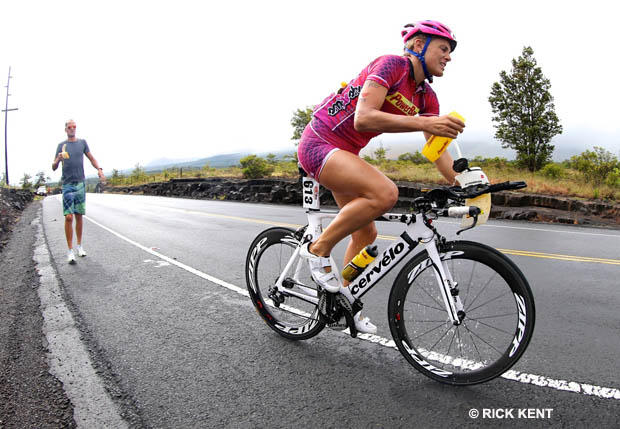
ST: Last time you raced Ultraman, Amber Monforte , you, Shanna Armstrong and Kathy Winkler all broke Tina Bischoff’s 21-year race record. Amber was very fit that time and rode 7:57 on Day 2, half an hour better than you rode this year.
Hillary: Don’t get me wrong. We raced hard that year for sure. But we also had quite favorable conditions on Day 2 [a tailwind from Hilo to Waimea]. I think that is such a long ride that conditions play a significant role. On Day 2 everyone descends from Kilauea together for the first 30 miles, then things split up when you hit the flat and there is no drafting the rest of the way. In 2010, I was thinking, ‘Gosh we have 7-plus hours of riding to go. I’m not going to have to ride that hard.’ And I was SO wrong. Amber [Monforte] knew she needed to go with the guys. And I missed the boat.
ST: In 2010 conditions were way better and you swam 2:20. Why did you think 2:37 was a good swim in 2013?
Hillary: Records and times are a tough thing to go after because conditions vary so much. This year my swim performance was way better but my time was slower. In 2010 it was absolutely smooth sailing, but this year we had a fair amount of resistance from the current the last third of the swim.
ST: What did it feel like?
Hillary: Honestly I’ve swum in way, way worse conditions. But at the end of 10 kilometers, it was tough enough that I felt was slowing down and lost momentum. For as much prep as I put into it, I came out of that swim feeling like death. The first hour and a half of the bike I felt I was going backwards. I was quite alarmed how much that effort took.
ST: You expected the some guys to catch you.
Hillary: Tim Sheeper is strong, but he made up the 12 minutes I led after the swim in an hour. But he only put another 15 minutes on me the rest of the [90 mile] ride. That's how much I was hurting at the beginning.
ST: What was going on in your head when you had such a big lead?
Hillary: It's not fun. I was absolutely prepared to race Amber at her best and I rode super stressed — in my imagination Amber was closing on me all day. I didn’t know until the last 20 miles of the ride that I was putting time into her. Great news — but that was the first I’d heard about it.
ST: Amber was apparently not anywhere as fit as she was in her three previous women’s wins. Did you feel in competition with the men?
Hillary: The closer we got to the finish, the more I was stoked I might be able to pull off second overall on the stage. I could smell it, I wanted it, and I was riding scared of the guys. That fueled me and kept me pushing.
ST: Would it help if your crew looped back to find out where people were?
Hillary: Yeah, but with a 30-minute gap on Amber [3:09:07] out of the swim, they wouldn’t have time to get back to her and tend to my needs.
ST: Did you train for this at home in Tucson?
Hillary: I spent two weeks in Kona during the Ironman. But I was primarily there working to promote the women’s sports clothing line Smashfest Queen that I run with my partner Michele Landry. The only specific Ultraman preparation I did during that time was to swim the course once with a girlfriend of mine.
ST: No long bikes or long runs?
Hillary: Nothing crazy long. But I had done two Ironmans in less than six days in September. So I took some down time after that and in Kona I was gradually getting back into training. No long runs until I got home.
ST: Tell us about those runs.
Hillary: [Her husband] Maik [Twelsiek] and I did a rim to rim to rim crossing of the Grand Canyon. That was about 40 miles and we did it three weeks out from the start of the race.
ST: How long did it take you?
Hillary: Fourteen hours — that included stopping for food and pictures. We started and finished in the dark, so when we didn't have light I was very, very careful – I did not want to twist an ankle.
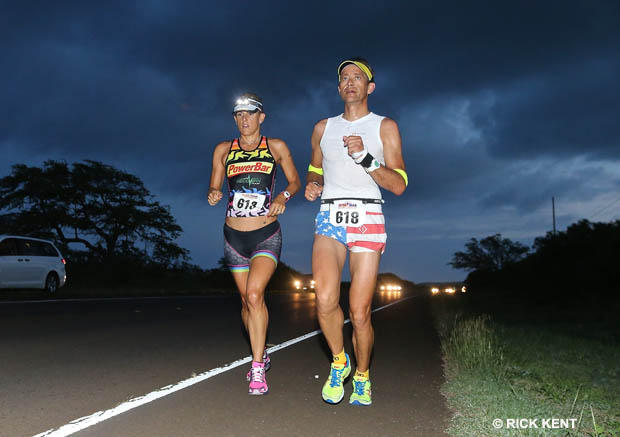
ST: On Day 1 you were happy to be second overall. What happened on day 2?
Hillary: The second day went a ton better than last time. I was a lot smarter and found a guy to ride with who was maintaining a good pace and would push me. Chris Draper was great! There were a lot of places where we were riding into a headwind and you’re going downhill and seemed to be going nowhere. I wondered, ‘Do I have a flat tire? Am I bonking?’ It was so nice to have someone up ahead to reinforce that I was going OK. We also caught a few guys along the way and that was a boost.
ST: You may not have been any faster than last time on Day 2 [8:28:09 in 2010, 8:26:45 in 2013]
Hillary: I think I was a couple minutes faster. I crossed the line at 8:20:45, but they added six minutes to my time because in the very beginning of the no draft zone, we came around a corner to find Chris Draper had crashed. Tim Sheeper and I ran up on Chris who was picking up his bike and we both sat up to avoid the situation. Then Bam! Thirty seconds later, the ref calls me for drafting off Sheeper, who I clearly had no intention of riding with. LAUGHS
ST: What did you think of the rules enforcement?
Hillary: Ridiculous! I've gotta say it was absurd. The ref followed Chris Draper, this one Brazilian guy and me I all the way through Hilo. We were riding at a legal distance and he yelled at us, ‘Are you guys ever gonna split up?’ I was thinking, ‘Actually I hope we don’t split up. Why the hell would we want to split up?’ I said to him, ‘Well, it's a long lonely 170 miles when no one's in sight.’ And he says, ‘They call it Ultraman for a reason.’ After that, I thought, ‘Screw it. I am not taking a chance — I am just going to ride 500 meters behind.’ And that’s what I did. I was looking at the ref like. ‘See, I am half a kilometer behind him. And I am riding his pace. Are you happy?’
ST: Any tough moments?
Hillary: On the road to Waimea, Chris pulled over to mess with his bike and I passed him. I was mentally tired and spacing out. Well into Waimea I thought I missed the turn up to the Kohalas, so I slowed. Finally I stopped and unclipped. Then Chris appeared. ‘What are you doing?’ I said, ‘I thought I missed the turn.” He said, ‘No it's up ahead. Follow me!’ I followed him up the climb and he dropped me like bad habit coming down that steep hill into Hawi because I am a total wimp on descents and it was blowing a gale.
ST: Discretion was the better part of valor?
Hillary: I thought there was nothing to gain making up 10 minutes here, even though I was feeling much better than I did in 2010.
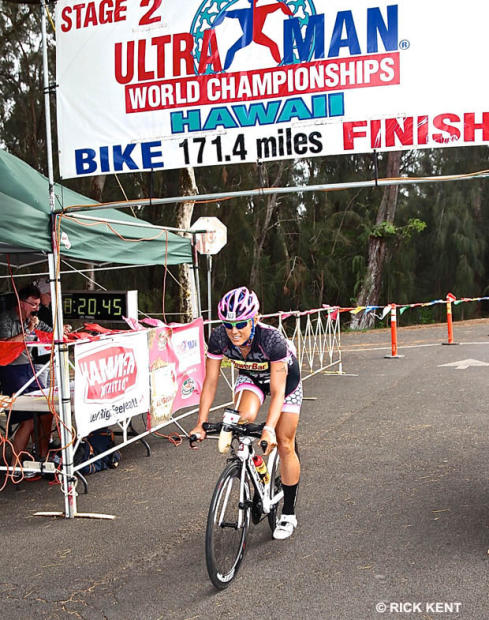
ST: Why were you doing better?
Hillary: I don’t eat solid food in an Ironman so in 2010 I didn’t realize how desperate things would get in Ultraman if I didn’t pound food during and after every day. I learned the hard way. My crew would hand me things but I couldn’t muster enough energy to sit up and grab a bottle. At the end of Day 2, I was in one huge massive bonk. This year was a completely different world. I kept eating. I was coherent. I felt strong. And I could push myself to a new level.
ST: How did you feel after Day2 this year?
Hillary: I felt fine when I finished. But when I lay down on the massage table I started to feel like death. I thought, ‘Oh my God. I have to run 52 miles tomorrow.’ At 3 in the afternoon I was ready to sleep for the night despite the mass quantities of caffeine I had consumed. Totally nauseous. Shaking. The works!
ST: Wasted like you felt at the end of your first Ultraman?
Hillary: This was a reminder – because I had felt so strong the first two days – ‘Yep, things are about to get real on the Island.’ But the next few hours, I ate a bunch and I spent some time in my Recovery Pump. We stayed in a little B&B that had a tiny pool and I swam 15 minutes and felt so much better. I thought, ‘OK I’ll be good to go.’ I actually slept that night — in 2010 I was so exhausted I couldn’t sleep. This year my body handled the effort so much better.
ST: Why was your run so much better this year?
Hillary: I definitely had a better feel for what I needed to do. When I was training I put myself into the state I knew I would be in on race day. I did a 50k solo training run, just me and my Camelbak, straight down the highway in Tucson that had a lot of slight downhills. When I ran the Grand Canyon that was a huge deposit in the run bank. Plus I followed that up with another 40 miles over the next two days in Sedona. I did about 80 miles in three days.
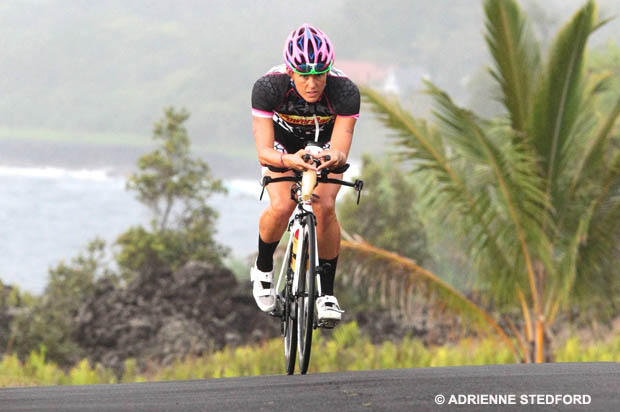
ST: You had a 2 hour lead at the end of Day 2. Were tempted to just jog it in?
Hillary: Don't get me wrong. Winning the women’s race was hugely important to me. So I did have a moment thinking ‘Oh gosh should I cruise this run to make sure I don't blow myself up? Or do I carry on and really push the double marathon as I had planned?’ One of my big goals was to have a great run and I thought I could run around 7:30. I also knew I could end up crawling on the Queen K as a result.
ST:You didn’t need to race flat out to win.
Hillary: Exactly. But I had already invested two days of racing and many, many months of training and I wasn’t willing to just let go of that. I wanted to put the final nail in the coffin. I really had to go for it. I was not thinking about racing the boys. Over a double marathon at the end of this race, you can’t be focused on racing anyone else but yourself. I was racing my own goal time.
ST: You ran a remarkably even paced double marathon.
Hillary: I ran the first 25 to 30 miles in about 6th place. Then when I did start picking off the boys, it was a huge surprise. Every guy I passed was so encouraging. I ran a few miles with Johan Dembeck and later with Christian Isakson. They were great company. When I passed James Player to move into 2nd on the run, it was completely surreal.
ST: Was it even more surreal to pass six-time champion Alexandre Ribeiro previously?
Hillary: When I saw his crew’s van I didn’t have everyone’s numbers memorized, so I didn’t know who it was. But I sure as heck didn’t think it was him. So that was the bigger surprise.
ST: Did he have a few words for you?
Hillary: Oh yeah. I love that guy. His whole crew was cheering for me and he was really encouraging. He said something like, ‘Amazing race. You are doing so well.’ I thought he might run with me. He was walking a little bit but still running. I said, ‘Come on!’ But he was pretty smashed.
ST: Near the end did you have a time goal?
Hillary: About halfway through the run, I had a low period starting at Kawaihae [Mile 17]’til right around the first marathon mark. I stopped looking at my Garmin because I was sure I was falling off 7:30 pace. Especially when I was passing those guys, I thought, ‘Gosh, it’s obviously super-hot. This is not a fast run day.’
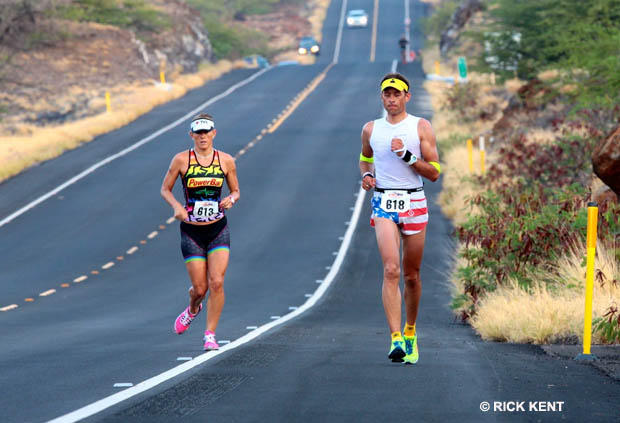
ST: What did you do to guard against heat exhaustion?
Hillary: My crew stopped every kilometer and every five minutes I was eating and drinking, grabbing ice, putting it into my pocket, putting it down my shorts.
ST: Did you know you were running second?
Hillary: I started out the run a little too fast. So from the very beginning I knew what place I was. Bottom line, if there was only one dude ahead of me, it’s a good run. So when I finished and saw 7:23, I was totally blown away.
ST: What were you feeling?
Hillary: I was pretty darn happy to be done running. That and just incredible gratitude for my crew and appreciation for the work they had to do this weekend.
ST: Tell us a little bit about them?
Hillary: I had Maik obviously. And Dave Easa, who was my pacer last time. He is a very, very accomplished runner who ran Western States in 22 hours and has a 2:31 marathon PR. The minute I told him I was going to go back to Ultraman this year he said ‘I am coming and I will crew for you — period.’ The final piece of the puzzle was my friend Marilyn McDonald. Two other friends were interested in coming but they canceled. Marilyn is one of my training partners back home and she had Thanksgiving plans. But they changed. On my last ride the Sunday before the race, I thought, ‘Maybe she wants to come to Hawaii?’ So Maik and I stopped at a gas station and I texted her: ‘Hey! Any chance you’d want to come to Hawaii?’ She said, ‘Sure. When?’ ‘Tomorrow morning?’ ‘OK!’ I bought her an airplane ticket when I got home.
ST: How many people do you need for a support crew?
Hillary: Marilyn is a coach and a good friend and has trained with me a million hours. I felt great having her come because she knows me as an athlete and she can read me so well. So she was THE perfect person. The guys were great, but having them without Marilyn would have been way chaotic – especially when one of them was pacing me on the run. Marilyn kept everything together over the three days. I've been in this game long enough to know that the occasions when all of your work and all you've put in to the preparation actually works out just the way you want to does not happen very often. I was a very, very grateful for that.
ST: How much of a difference did your coach Siri Lindley make for you for this race?
Hillary: I started with her a year and a half ago. For this Ultraman, I told her that I wanted to write my own program. Siri is still 100 percent my coach. But I had enough specific things that I wanted to do. And so I was always updating her on what I was doing and we were in constant contact during the race.
ST: And how much has she done for you in general?
Hillary: Siri helped me get my confidence back – something I lost when I stopped working with Brett Sutton at the end of 2008. After I won Ironman Wisconsin that year, he told me it was time to retire. Basically I didn’t have a real career and I had no real results to speak of before I joined Brett. I went from that to 10 podiums and an Ironman win. So when someone you’ve put all of your trust in, and who has done you so much good over three years tells you, 'You need to retire now' — that’s a hard thing. I didn’t get it out of my head until Siri.
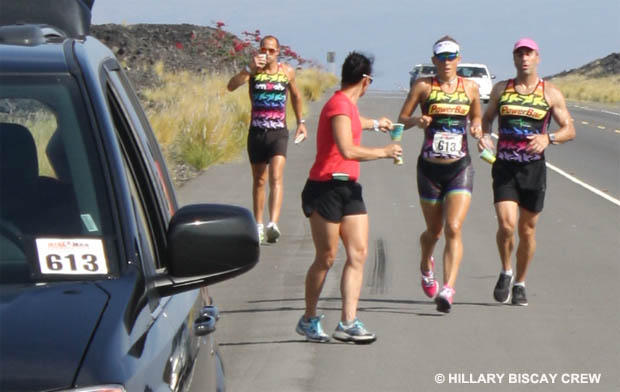
ST: What was her key contribution?
Hillary: She got me knowing I am stronger athlete than when I was with Brett. I might not be placing as high, because the game has changed. But I wanted to prove him wrong. I wanted to know I actually can get faster. She got me to that place not just through physical training but because of the way she helped me mentally approach racing. That was a huge, huge, huge asset.
ST: How did she go about it?
Hillary: I know I am not the fastest or the most talented out there in Ultraman or any other race. But Siri constantly reminds me of my strengths — the work I am able to put in to prepare, the fortitude I have in the face of adversity. This is incredibly helpful and gives me something to draw upon on race day. The other big piece is she trained me to race myself. It doesn’t matter what race or who the competition is. While I desperately wanted to win the Ultraman world championship, at the end of the day, my focus, my execution was on racing myself.
ST: Ultraman has many doubters as well as believers. The doubters say that no one who comes to this race is talented enough to contend at big events. Other people see this as a unique athletic challenge and a hell of a race. What do you think?
Hillary: I was of both minds before I came to this race in 2010. I very quickly learned that the level of racing that takes place here is no joke! We have seen great athletes like Jonas Colting [who won two medals at ITU Long Course Worlds] humbled by this race, as I was in 2010. I am not putting myself on Jonas’ level. But we have seen people who have won Ironman races, like Scott Molina and Gordo Byrn, tested out here. I have done 63 Ironman distance races and I love going to new races and discovering new challenges. This was a really new challenge, a new frontier for me. My first time here I found it hard in more ways than I could have imagined. I think that is something that people who haven’t experienced it don’t get. There are so many moving pieces. You multiply that by three days of racing and you have an equation that is three times more complicated which challenges you mentally, physically and strategically. And that’s very alluring.
ST: What about the feel of a small race?
Hillary: It has a small, grass roots feel, more like an ultra-running trail race. It is super cool.
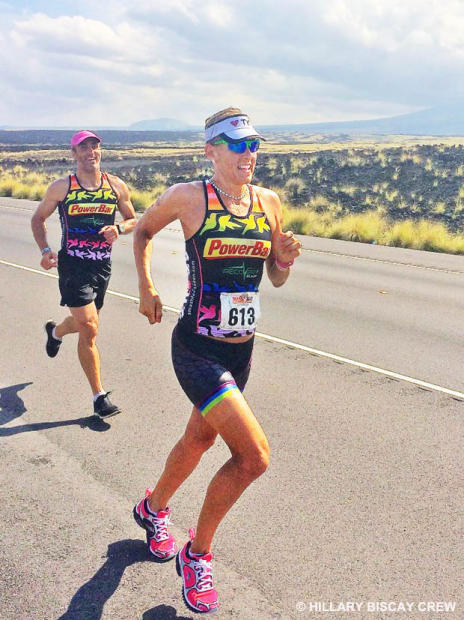
ST: What does this race and winning the world championship mean to you and your sponsors?
Hillary: This and winning Ironman Wisconsin in 2008 are the two greatest accomplishments of my career. My sponsors [Power Bar, TYR, Zipp, ISM Rudy Project, Brooks Airbrush Studios, and Recovery Pump] said we will bonus you for this race like we do for an Ironman. They weren't paying up front travel expenses so I had to not screw it up. But if I did well they would reward me. If not for that, I could not have been here. As a professional athlete you can’t afford this kind of physical toll and not be compensated for it. It will take quite a while to recover and that’s energy that could be devoted to training for another race that will earn me a paycheck. But fortunately for all of us, this race gets a lot of publicity. I think a ton of people were following the race. The response has been insane.
ST: How did your finishing 3rd overall add to the impact?
Hillary: I think my sponsors were pretty excited. I also think for those doubters that you mentioned, that solidified the legitimacy of the performance in their mind. They can look at me and say, ‘OK she finished ahead of all but two guys. That is a pretty legit performance.’
ST: Is Ultraman your best distance?
Hillary: Better than Ironman? Yeah I think it suits me even better.
ST: What makes your body able to withstand all those long races?
Hillary: I think I am strong but I am not particularly fast. I have a diesel engine. Mentally and physically I can keep going when things get long and get rough. That’s mental. Physically my body holds up well. I’m built for the long stuff. I am not a small girl. I eat a lot. All those things make my body able to withstand a very large quantity of training.
ST: What does Maik think of this?
Hillary: He was really stoked. Marilyn told me that Maik got so worked up while I was racing that he kept getting confused. He wanted to drive the car in the wrong direction and was spinning in circles he was so excited.
ST:Was he worried about you?
Hillary: Maik saw the state I was in after that 2010 race. Not just after the race but parts of Day 2 and Day 3. I think he was impressed to see me this time.
ST: Will you come back in 2014?
Hillary: I can’t come back next year because we have a huge family Thanksgiving. Family is number one no matter what. Right now if you asked I’d say I’d love to be back in 2015. But that’s a long time down the road. So for now I’m just going to savor the fun.
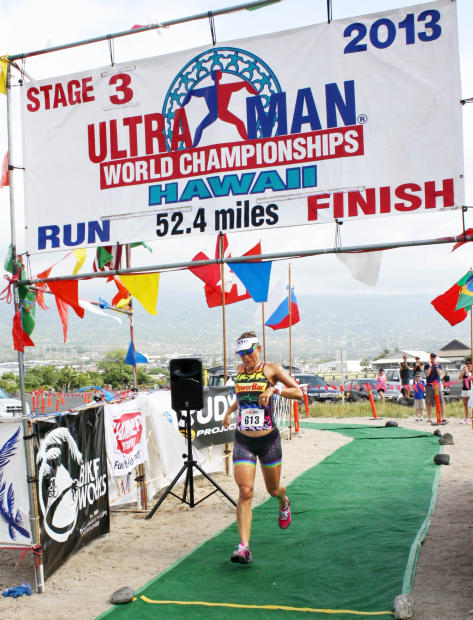


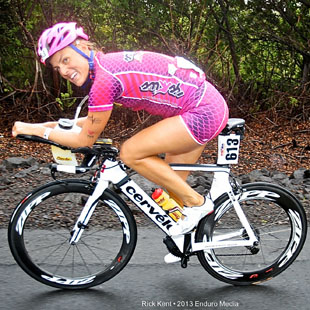
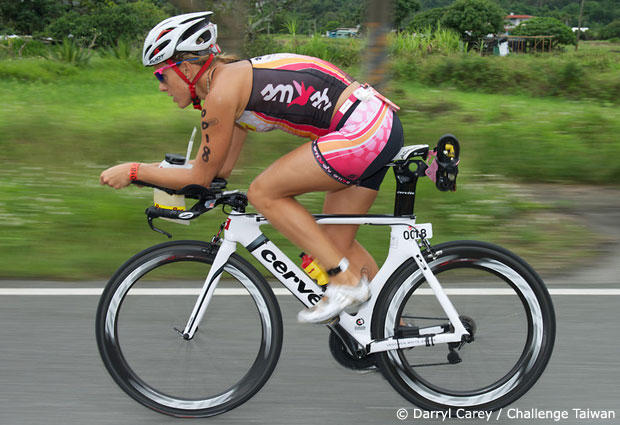
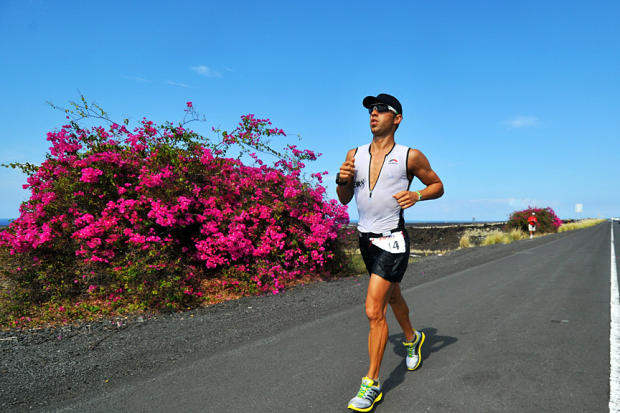
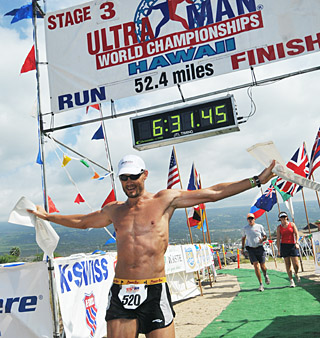
Start the discussion at forum.slowtwitch.com